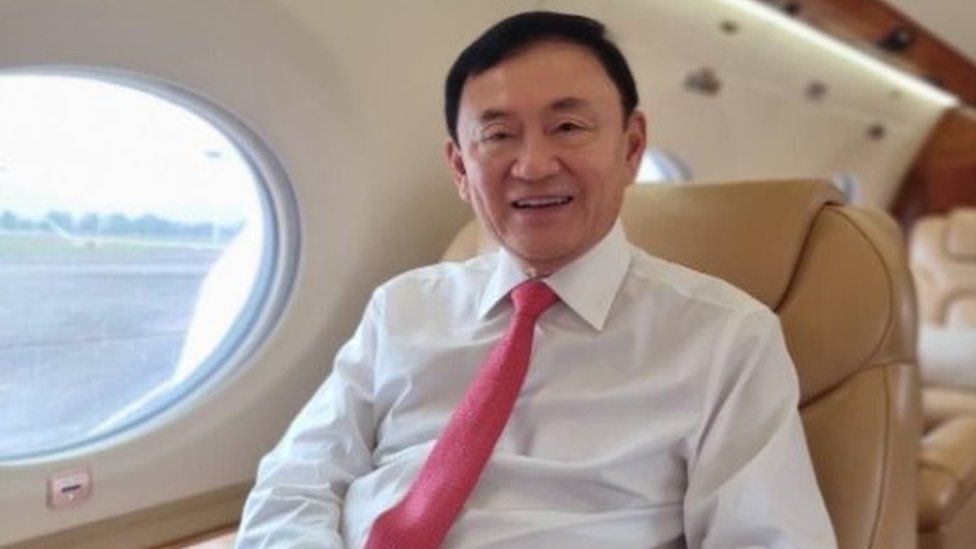The return of former prime minister Thaksin Shinawatra from 15 years of exile has been often promised, and always hotly anticipated.
He is one of the most divisive figures in Thai history, a brash, politically-ambitious tycoon whose repeated successes in elections going back more than two decades provoked strong reactions from conservative forces – ranging from military coups, the occupations of government ministries and airports, to contentious court verdicts which have sacked three prime ministers and dissolved three pro-Thaksin political parties.
Now he is on his way back, presumably after striking a quiet deal with his royalist adversaries to keep him out of prison. He has sentences of about 10 years outstanding from criminal cases he says were politically motivated.
He is expected to be whisked straight from the airport to the Supreme Court in Bangkok, and from there probably to spend the night in a prison hospital. No-one expects him to stay in custody long.
All this has coincided with the attempt by his party, Pheu Thai, to form the next government – a byzantine process which in three months has taken Thailand full circle from the heady hopes of a new dawn led by the radical young Move Forward party, which won the most seats in the May election, and initially formed a partnership with Pheu Thai; to what is now certain to be a coalition of almost everyone but the reformers, including two parties led by former coup-makers – a deal with its sworn enemies that Pheu Thai vowed it would not do.
Pheu Thai insists the two developments are unconnected. Few people believe that.
It is true that Pheu Thai’s hands have been tied by the unelected senate, a 250-seat constitutional landmine planted in Thailand’s political landscape by the military junta which ruled for five years after a 2014 coup.

And Pheu Thai’s bargaining position was weakened by its poorer-then-expected performance in the election, when it lost a lot of support to Move Forward and for the first time was relegated to second place.
The senators, all appointed under the junta, are allowed to join the 500 elected MPs in voting for the new prime minister. Their thinly-disguised remit is to block any party which might threaten the status quo – the nexus of monarchy, military and big business which has dominated decision-making in Thailand for decades.
Unsurprisingly they refused to back the Move Forward-led coalition with Pheu Thai, despite its commanding majority in the lower house. When it was Pheu Thai’s turn to negotiate a new coalition, its need for senate support meant it had to take in some of its former opponents.
However some Pheu Thai politicians argue that the party should have held out for a better deal, by refusing to be in a government with the most hard-line conservative groups. Any minority administration formed without Pheu Thai and Move Forward would quickly collapse, because the senators cannot join normal parliamentary votes on issues like the budget.
But the Pheu Thai leadership was not willing to wait; it even invited the ultra-royalist party United Thai Nation to join the coalition, whose leaders have in the past been virulently critical of the Shinawatra family and their supporters, and were instrumental in ousting the last Pheu Thai government led by Thaksin’s sister Yingluck. That these two factions will now sit together in the same government is a mark of how far Thai politics has shifted.
In the end for the ultra-royalists the perceived threat posed by Move Forward, and by a younger generation of Thais demanding a conversation about the power and wealth of the monarchy, eclipsed their long feud with the Shinawatra family.
For the Shinawatras, and Pheu Thai’s more conservative, business-minded elements, getting into government again and guaranteeing the deal to bring Thaksin back, have been bigger priorities than worrying about the party’s reputation.
But there are those, even within Pheu Thai, who are horrified by the cynical pragmatism of this deal. They are warning that the party will lose even more of its once-passionate grass-roots supporters, and lose, perhaps forever, the dominance it held over electoral politics in Thailand for two decades.
Related Topics
- Asia
- Thailand
- Thaksin Shinawatra
